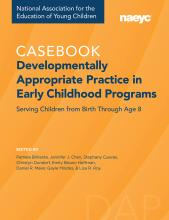Casebook: Developmentally Appropriate Practice in Early Childhood Programs Serving Children from Birth Through Age 8

About the Book
-
Make connections to the fourth edition of Developmentally Appropriate Practice in Early Childhood Programs
-
Think critically about the influence of context on educator, child, and family actions
-
Discuss the effectiveness of the teaching practices and how they might be improved
-
Support your responses with evidence from the DAP position statement and book
-
Explore next steps beyond the case details
-
Apply the learning to your own situation
Table of Contents
- Editors, Contributors, and Reviewers
- Introduction and Book Overview | Jennifer J. Chen and Dana Battaglia
-
Part 1: Creating a Caring, Equitable Community of Learners | Lisa R. Roy
- 1.1 Missed Opportunities: Relationship Building in Inclusive Classrooms | Julia Torquati
- 1.2 “My Name Is Not a Shame” | Kevin McGowan
- 1.3 Fostering Developmentally Appropriate Practice Through Virtual Family Connections | Lea Ann Christenson
- 1.4 Counting Collections in Community | Amy Schmidtke
- 1.5 The Joy Jar: Celebrating Kindness | Leah Schoenberg Muccio
- 1.6 Prioritizing Listening to and Learning from Families | Amy Schmidtke
-
Part 2: Engaging in Reciprocal Partnerships with Families and Fostering Community Connections | Stephany Cuevas
- 2.1 Julio’s Village: Early Childhood Education Supports for Teen Parents | Donna Kirkwood
- 2.2 Healthy Boundaries: Listening to Children and Learning from Families | Jovanna Archuleta
- 2.3 Roadmap of Family Engagement to Kindergarten: An Ecological Systems Approach | Marcela Andrés
- 2.4 Taking Trust for Granted? The Importance of Communication and Outreach in Family Partnerships | Suzanna Ewert
- 2.5 Book Reading: Learning About Migration and Our Family Stories | Sarah Rendón García
-
Part 3: Observing, Documenting, and Assessing Children’s Development and Learning | Gayle Mindes
- 3.1 Pairing Standardized Scale with Observation | Megan Schumaker-Murphy
- 3.2 The Power of Observing Jordan | Marsha Shigeyo Hawley and Barbara Abel
- 3.3 “But What Is My Child Learning?” | Janet Thompson and Jennifer Gonzalez
- 3.4 Drawing and Dialogue: Using Authentic Assessment to Understand Children’s Sense of Self and Observe Early Literacy Skills | Brandon L. Gilbert
- 3.5 The ABCs of Kindergarten Registration: Assessment, Background, and Collaboration Between Home and School | Bridget Amory
- 3.6 Creating Opportunities for Individualized Assessment Activities for Biliteracy Development | Esther Garza
- 3.7 Observing Second-Graders’ Vocabulary Development | Marie Ann Donovan
- 3.8 Writing Isn’t the Only Way! Multiple Means of Expressing Learning | Lee Ann Jungiv
-
Part 4: Teaching to Enhance Each Child’s Development and Learning | Emily Brown Hoffman
- 4.1 Engaging with Families to Individualize Teaching | Marie L. Masterson
- 4.2 Tumbling Towers with Toddlers: Intention and Decision Making Over Blocks | Ron Grady
- 4.3 What My Heart Holds: Exploring Identity with Preschool Learners | Cierra Kaler-Jones
- 4.4 “I See a Really Big Gecko!” When Background Knowledge and Teaching Materials Don’t Match | Germaine Kaleilehua Tauati and Colleen E. Whittingham
- 4.5 Using a Humanizing and Restorative Approach for Young Children to Develop Responsibility and Self-Regulation | Saili S. Kulkarni, Sunyoung Kim, and Nicola Holdman
- 4.6 Joyful, Developmentally Appropriate Learning Environments for African American Youth | Lauren C. Mims, Addison Duane, LaKenya Johnson, and Erika Bocknek
-
Part 5: Planning and Implementing an Engaging Curriculum to Achieve Meaningful Goals | Daniel R. Meier
- 5.1 Using the Environment and Materials as Curriculum for Promoting Infants’ and Toddlers’ Exploration of Basic Cause-and-Effect Principles | Guadalupe Rivas
- 5.2 Social Play Connections Among a Small Group of Preschoolers | Leah Catching
- 5.3 Can Preschoolers Code? A Sneak Peek into a Developmentally Appropriate Coding Lesson | Olabisi Adesuyi-Fasuyi
- 5.4 Everyday Gifts: Children Show Us the Path—We Observe and Scaffold | Martha Melgoza
- 5.5 Learning to Conquer the Slide Through Persistence and Engaging in Social Interaction | Sueli Nunes
- 5.6 “Sabes que todos los caracoles pueden tener bebés? Do You Know that All Snails Can Have Babies?” Supporting Children’s Emerging Interests in a Dual Language Preschool Classroom | Isauro M. Escamilla
- 5.7 “Can We Read this One?” A Conversation About Book Selection in Kindergarten | Larissa Hsia-Wong
-
Part 6: Demonstrating Professionalism as an Early Childhood Educator | Christyn Dundorf
- 6.1 Take a Chance on Coaching: It’s Worth It! | Lauren Bond
- 6.2 It Started with a Friendship Parade | Angela Vargas
- 6.3 The World Outside of the Classroom: Letting Your Voice Be Heard | Meghann Hickey
-
Part 7: Supporting Children with Disabilities and Implementing Inclusive Practices | Pamela Brillante
- 7.1 Communication as a Two-Way Street? Creating Opportunities for Engagement During Meaningful Language Routines | Kameron C. Cardenv
- 7.2 Eli Goes to Preschool: Inclusion for a Child with Autism Spectrum Disorder | Abby Hodges
- 7.3 Preschool Classroom Supports and Embedded Interventions with Coteaching | Racheal Kuperus and Desarae Orgo
- 7.4 Addressing Challenging Behavior Using the Pyramid Model | Ellie Bold
- 7.5 Dual Language or Disability? How Teachers Can Be the First to Help | Alyssa Brillante
- 7.6 Adapting and Modifying Instruction Using Reader’s Theater | Michelle Gonzalez
- 7.7 Supporting Children with Learning Disabilities in Mathematics: The Importance of Observation, Content Knowledge, and Context | Renee B. Whelan
-
Part 8: Supporting Dual Language Learners and Respecting Cultural and Linguistic Diversity | Jennifer J. Chen
- 8.1 Facilitating a Child’s Transition from Home to Group Care Through the Use of Cultural Caring Routines | Josephine Ahmadein
- 8.2 Engaging Dual Language Learners in Conversation to Support Translanguaging During a Small Group Activity | Valeria Erdosi and Jennifer J. Chen
- 8.3 Incorporating Children’s Cultures and Languages in Learning Activities | Eleni Zgourou
- 8.4 Adapting Teaching Materials for Dual Language Learners to Reflect Their Home Languages and Cultures in a Math Lesson | Karen Nemeth
- 8.5 Studying Celestial Bodies: Science and Cultural Stories | Zeynep Isik-Ercan
- 8.6 Respecting Diverse Cultures and Languages by Sharing and Learning About Cultural Poems, Songs, and Stories From Others | Janis Strasser
- Index
Book Details
ISBN: 978-1-952331-12-1
Publish Date: 2023
Faculty Resources
Coming soon. To access tips and resources for teaching the cases, please complete this form. You'll be able to download the resources after you complete the form.
Teacher Inquiry Group Resources
Coming soon. To access discussion questions to deepen your learning, please complete this form. You'll be able to download the resources after you complete the form.
More DAP Resources
To read the position statement, access related resources, and stay up-to-the-minute on all things DAP, visit NAEYC.org/resources/developmentally-appropriate-practice.
Pamela Brillante, EdD, is professor in the Department of Special Education, Professional Counseling and Disability Studies, at William Paterson University. She has worked as an early childhood special educator, administrator, and New Jersey state specialist in early childhood special education. She is the author of the NAEYC book The Essentials: Supporting Young Children with Disabilities in the Classroom. Dr. Brillante continues to work with schools to develop high-quality inclusive early childhood programs.

Jennifer J. Chen, EdD, is professor of early childhood and family studies at Kean University. She earned her doctorate from Harvard University. She has authored or coauthored more than 60 publications in early childhood education. Dr. Chen has received several awards, including the 2020 NAECTE Foundation Established Career Award for Research on ECTE, the 2021 Kean Presidential Excellence Award for Distinguished Scholarship, and the 2022 NJAECTE’s Distinguished Scholarship in ECTE/ECE Award.
Stephany Cuevas, EdD, is assistant professor of education in the Attallah College of Educational Studies at Chapman University. Dr. Cuevas is an interdisciplinary education scholar whose research focuses on family engagement, Latinx families, and the postsecondary trajectories of first-generation students. She is the author of Apoyo Sacrifical, Sacrificial Support: How Undocumented Parents Get Their Children to College (Teachers College Press).
Christyn Dundorf, PhD, has more than 30 years of experience in the early learning field as a teacher, administrator, and adult educator. She serves as codirector of Teaching Preschool Partners, a nonprofit organization working to grow playful learning and inquiry practices in school-based pre-K programs and infuse those practices up into the early grades.
Emily Brown Hoffman, PhD, is assistant professor in early childhood education at National Louis University in Chicago. She received her PhD from the University of Illinois at Chicago in Curriculum & Instruction, Literacy, Language, & Culture. Her focuses include emergent literacy, leadership, play and creativity, and school, family, and community partnerships.
Daniel R. Meier, PhD, is professor of elementary education at San Francisco State University. His publications include Critical Issues in Infant-Toddler Language Development: Connecting Theory to Practice (editor), Supporting Literacies for Children of Color: A Strength-Based Approach to Preschool Literacy (author), and Learning Stories and Teacher Inquiry Groups: Reimagining Teaching and Assessment in Early Childhood Education (coauthor).
Gayle Mindes, EdD, is professor emerita, DePaul University. She is the author of Assessing Young Children, fifth edition (with Lee Ann Jung), and Social Studies for Young Children: Preschool and Primary Curriculum Anchor, third edition (with Mark Newman). Dr. Mindes is also the editor of Teaching Young Children with Challenging Behaviors: Practical Strategies for Early Childhood Educators and Contemporary Challenges in Teaching Young Children: Meeting the Needs of All Students.
Lisa R. Roy, EdD, is executive director for the Colorado Department of Early Childhood. Dr. Roy has supported families with young children for over 30 years, serving as the director of program development for the Buffett Early Childhood Institute, as the executive director of early childhood education for Denver Public Schools, and in various nonprofit and government roles.
